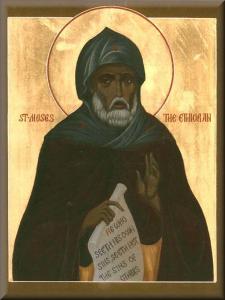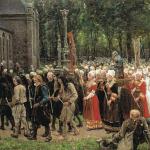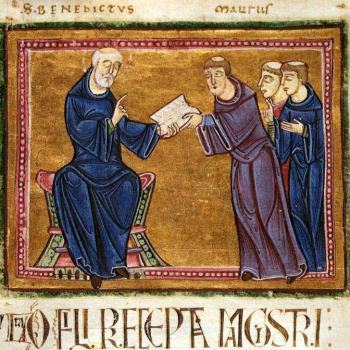
St. Moses the Ethopian, once he escaped all forms of slavery which afflicted him, the first being that which was imposed upon him from outside himself, the second, the one which he imposed upon himself through giving in to inordinate desires, he was able to become one of the greatest, one of the most profound, monks of his era. He learned more than enough discipline through the harsh, abusive treatment which he received as a slave, but once he was no longer a slave, he became a robber, one who was not so concerned about such discipline, as he let his worst passions control him and lead him astray. But he found that the life as robber was difficult, and he got himself in trouble, which is why he fled from authorities and hid at a monastery; it was there, he found a new calling in life, one where he was not only to become a Christian, but a monk.
Once Moses learned he had to change his ways, he took on a new way of life, once which allowed him overturn the slavery to his passions and use all he had learned, even as a slave, to follow Christ. The harsh discipline he received before, while it was evil, probably made it easier for him to follow the discipline expected from the desert fathers. What was difficult was for him to accept mercy, that is, though he could and would find it easy to show others mercy, he still needed to recognize he could be and would be given it himself. He had to learn all that he had done in the past did not define him and who he was. He had to accept that he could and would be able to become someone better. This is why, though he did not think he should let his past undermine his progress, he also thought he could not forget his own past, accept mercy for himself, and then begin to judge and condemn others. This wisdom applies to all Christians, as they should all realize, as they have received mercy, so they should be merciful to others. But it was extremely important for monks to embrace this, because those who were becoming monks at this time came from all kinds of backgrounds, some who were rich, some who were poor, some who had a natural inclination to virtue all their lives, but many who, like him, had a history of embracing all kinds of vices before becoming a monk. He knew that their background should not define them and who there were in the community, but he also understood that once someone became a member of a monastic community, their inclinations and old habits would not die easily, and so the rest of the community should treat them with mercy as they strived for perfection. This meant, monks should be humble, and in their humility, never judge others “The monk must die to his neighbour and never judge him at all, in any way whatever.”[1] They should all accept their own humble status in life, realizing that they are working out their salvation with fear and trembling, working to deal with their own sins instead of that of others:
If the monk does not think in his heart that he is a sinner, God will not hear him. The brother said, ‘What does this mean, to think in his heart that he is a sinner?’ Then the old man said, ‘When someone is occupied with his own faults, he does not see those of his neighbour.’[2]
Moses learned that as a monk, he should put into practice all the radical exhortations of Christ, including, and especially Christ’s pacifism. Jesus said that Christians should not seek revenge upon others, that they should strive for peace, undermining any and all pretense for violence. This is why Christ told them to turn the other cheek. Monks, because they are seeking after spiritual perfection, cannot ignore these exhortations, for any justification for violence counters the humility expected of monks. They must learn how to live in such a way they do no harm: “The monk must die to everything before leaving the body, in order not to harm anyone.” [3] This was something dear to him, for, before his conversion to the Christian faith, before his embrace of monasticism, he had embraced the way of violence and death, and he saw how it did not give him the peace and satisfaction he desired. He knew the justifications people could give for violence, and that the more people accepted those justifications for themselves, the more they became desensitized to it, and the more likely they would then embrace the path of violence and see nothing wrong with it. They would become bloodthirsty. Christians, even those who are not called to be monks, should heed the wisdom of Moses’ approach, making sure they do what they can to live out their faith by acting upon the words they use in prayer:
If a man’s deeds are not in harmony with his prayer, he labours in vain. The brother said, ‘What is this harmony between practice and prayer?’ The old man said, ‘We should no longer do those things against which we pray. For when a man gives up his own will, then God is reconciled with him and accepts his prayers.’ The brother asked, ’In all the affliction which the monk gives himself, what helps him?’ The old man said: ‘It is written, “God is our refuge and strength, a very present help in trouble”’ (Ps. 46.1).[4]
Thus, when we pray the Lord’s Prayer, we should take into consideration what we pray, and do what we can to manifest that prayer in our actions. We ask to be forgiven, acknowledging we are likewise to forgive others, That means, we must do what we can to be merciful to others, to truly live out our words. Similarly, we pray for God’s kingdom to be manifest on earth as it is in heaven, but again, that means we should strive to make the presence of the kingdom of God known on earth by our actions, with all its justice, all its grace, all its mercy, all its love, being the foundation for our work for justice in the world. Finally, we should be doing what we can to eliminate the temptation in our life to ignore the way of God’s kingdom and love by watching over ourselves and working to purify ourselves from those passions which would undermine the way of love:
The old man was asked, ‘What is the good of the fasts and watchings which a man imposes on himself?’ and he replied, ‘They make the soul humble. For it is written, “Consider my affliction and my trouble, and forgive all my sins” (Ps. 25.18). So if the soul gives itself all this hardship, God will have mercy on it.’[5]
Humility, Moses learned, was key, for by it, we recognize we need God’s help, we welcome it, and we accept the way that help is to be received. We likewise accept what God tells us upon reception of that help, that is, we are to share with others what we have been given, and to treat them as we have been treated by God, lest we find what we have been given is taken from us. It can be extremely difficult for us to embrace humility, but the more we struggle against pride, vainglory and the like, the more God will show us mercy and help us overturn such inordinate passions and the habits they have formed in us, and then, once we have overturned them, then, even if we do not become a monk like Moses, we will begin to see what he saw, and preach mercy and grace for all, even as he did.
[1] The Sayings of the Desert Fathers. trans. Benedicta Ward (Kalamazoo, MI: Cistercian Publications, 1984), 141 [Instructions of Abba Moses #1].
[2] The Sayings of the Desert Fathers, 141 [Instructions of Abba Moses #3].
[3] The Sayings of the Desert Fathers, 141 [Instructions of Abba Moses #2].
[4] The Sayings of the Desert Fathers, 141-2 [Instructions of Abba Moses #4].
[5] The Sayings of the Desert Fathers, 142 [Instructions of Abba Moses #5].
Stay in touch! Like A Little Bit of Nothing on Facebook.
If you liked what you read, please consider sharing it with your friends and family!
N.B.: While I read comments to moderate them, I rarely respond to them. If I don’t respond to your comment directly, don’t assume I am unthankful for it. I appreciate it. But I want readers to feel free to ask questions, and hopefully, dialogue with each other. I have shared what I wanted to say, though some responses will get a brief reply by me, or, if I find it interesting and something I can engage fully, as the foundation for another post. I have had many posts inspired or improved upon thanks to my readers.













